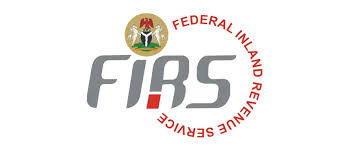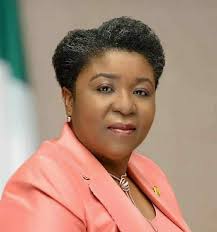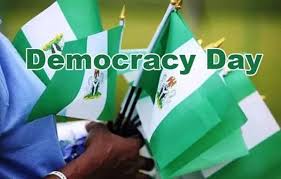News
IMF Raises Nigeria’s 2023 Economic Growth Forecast To 2.7%
The International Monetary Fund (IMF) has raised its forecast for Nigeria’s Gross Domestic Product (GDP), growth in 2023 to 2.7per cent.
The new forecast was contained in the IMF’s January World Economic Outlook (WEO), report released, yesterday.
The new forecast represents 0.1percentage points above the 2.6percent projected by the Fund October, last year.
The IMF also affirmed its 2.7per cent growth forecast for Nigeria this year (2022) earlier projected in the October WEO report.
However, the IMF forecasts contradict the World Bank’s forecasts of 2.5per cent and 2.8per cent Gross Domestic Product (GDP), growth for Nigeria’s economy in 2022 and 2023 respectively.
The World Bank forecasts were contained in its Global Economic Prospects report released two weeks ago.
However, the IMF in its January WEO report, downgraded its GDP growth forecast for Sub Saharan Africa to 3.7per cent and 4.0per cent for 2022 and 2023, respectively.
This represents 0.1percentage points lower than the 3.6per cent and 3.9per cent forecast made in its October 2021 WEO report.
Similarly, the IMF reduced its forecast for global economic growth to 4. per cent in 2023, representing 0.5percentage points lower than the 4.9per cent projected in the October World Economic Outlook (WEO).
Attributing the downgrade to the expected impact of restrictions to curb the Omicron variant of COVID-19, the IMF in the January WEO titled, “Rising Caseloads, a Disrupted Recovery, and Higher Inflation,” stated: “The baseline incorporates anticipated effects of mobility restrictions, border closures, and health impacts from the spread of the Omicron variant.
“These vary by country depending on the susceptibility of the population, the severity of mobility restrictions, the expected impact of infections on labour supply, and the importance of contact-intensive sectors. These impediments are expected to weigh on growth in the first quarter of 2022.
“The negative impact is expected to fade starting in the second quarter, assuming that the global surge in Omicron infections abates and the virus does not mutate into new variants that require further mobility restrictions.”
Meanwhile, the IMF has called on the Central Bank of Nigeria (CBN), and its peers in emerging and developing countries to adopt a tight monetary policy to curb rising inflation and stem outflow of foreign investment in response to the adoption of tight monetary policy in advanced countries.
The IMF said: “Less accommodative monetary policy in advanced economies will pose challenges for central banks and governments in emerging market and developing economies. Higher returns elsewhere will incentivize capital to flow overseas, putting downward pressure on emerging markets and developing economy currencies and raising inflation.
“Without commensurate tightening, this will increase the burden on foreign-currency borrowers, both public and private. But the tighter policy also brings costs at home, as domestic borrowers will find credit harder to come by. Overall, tighter policies will likely be appropriate in many emerging market and developing economies to stave off the threat of persistently higher inflation.
“Moreover, emerging markets are generally more resilient, with higher reserves and better current account balances than in the previous tightening cycle—including during the 2013 taper tantrum.
“But financial vulnerabilities remain, and many countries have higher public and private debt. Debt service burdens could therefore rise significantly with higher interest rates.
“Countries with stronger fiscal positions and clearer policy frameworks will be better placed to manage tighter global financial conditions.
“More generally, emerging market borrowers should extend debt maturities where feasible, while containing a further build-up of currency mismatches. Exchange rate flexibility can also help absorb shocks.
“But in economies with market distortions or balance sheet vulnerabilities limiting market access, the impact of capital flow reversals can imperil financial stability. In those economies, foreign exchange intervention may be needed to smooth disorderly market conditions and temporary capital flow management measures may be warranted—but should not substitute for needed macroeconomic policy adjustment.”
News
Learn How To Form Coalition Party From Tinubu, Sowunmi Tells Atiku

Spokesman to former Vice President Atiku Abubakar, and chieftain of the People’s Democratic Party (PDP), Mr Segun Sowunmi, has advised his principal, Atiku, to learn from President Bola Tinubu on how to form a coalition.
The Tide reports that in a bid to wrest power from President Tinubu in 2027, Atiku has been leading the movement by opposition politicians to form a coalition of political parties ahead of the next general election.
Last month, opposition politicians set up a team comprising former Minister of Transpiration, Rotimi Amaechi, and former Governor of Cross River State, Liyel Imoke, to decide whether to float a new party or fuse into an existing platform.
While the main opposition party, PDP, struggles with a perennial leadership crisis, the former Vice President is bent on establishing another political force to take power from the ruling party in 2027.
But Sowunmi, who has been Atiku’s ally for many years, disagrees with his move, saying instead of forming a coalition with another political platform, he should coalesce opposition politicians into the PDP.
Speaking during an interview on TVC on Tuesday, Sowunmi, who was Atiku’s campaign spokesperson in the last election, asked his principal to learn from President Tinubu on how to form a coalition.
Sowunmi believes Atiku, having benefitted from the PDP as a former Vice President and getting the party’s presidential ticket twice, should not seek to form a coalition that will not have the PDP as its base.
He said, “I’ve always said to people, people love with their hearts. I love atiku with my bones. But I can’t help him against himself. You can’t run vice presidency on PDP two times with Obasanjo, get presidential candidate on that same party two times. I don’t agree with him that the next best thing is to be shopping for…(a platform) If you want a coalition, why are you not coalescing them into your party?” he asked.
The former PDP governorship candidate in Ogun State advised the ex-VP to learn from Tinubu on how to build a coalition without dumping his political party.
“Look at your rival, your friend. You guys started together. At best, even if you want to say he’s building a coalition is he not coalescing opponents into his place”? Sowunmi asked again.
The PDP chieftain, who recently showered praises on Tinubu after he visited him, said the President has an “uncanny ability to make everybody individually feel special” regardless of political affiliations.
His words: “That guy (Tinubu) is something oh, he has this uncanny ability to make everybody individually feel special. It doesn’t matter whether you are a former foe or a president’s friend, every moment you share with him, I don’t know how he does it, though you’re going to leave the place feeling that you matter, feeling that he gets it, feeling that what you guys are talking about is important. And there’s something about him, when he gives you his word, he will say something like ‘ko le ye’, meaning that to the best of human ability, it will stand.”
Meanwhile, there have been conversations about Sowunmi’s political stance as many questioned his relationship with Atiku, with whom he shares a longstanding political relationship.
Asked about his relationship with Atiku following his meeting with Tinubu, Sowunmi said he doesn’t know if the former Vice President is upset.
“I don’t know whether Atiku is upset or not upset, but I know a lot of our followers are talking a lot of nonsense, and I’m wondering how I became attached to Atiku when I’ve been in PDP since 1999 never leaving,” he responded.
News
FIRS Introduces New SOP To End Tax Confusion Nationwide

The Federal Inland Revenue Service (FIRS) has introduced a new Standard Operating Procedure (SOP) to fix inconsistencies in tax services across its over 300 offices nationwide.
The move aims to make tax processes clearer, more transparent, and easier for Nigerians.
In a statement, Special Adviser on Communications and Advocacy to the FIRS Executive Chairman, Mr. Collins Omokaro, said the updated SOP is a key part of the agency’s plan to improve taxpayer experience.
He explained that, in the past, different FIRS offices used different methods, which often confused taxpayers.
“This is about people, experience, and impact. It’s a step towards a tax system that supports voluntary compliance and national development,” Omokaro said.
The new SOP provides a single guide for key processes like registration, payment, audit, and enforcement. This will ensure all FIRS offices follow the same steps, making the system fairer and more predictable.
FIRS Executive Chairman, Dr. Zacch Adedeji, described the SOP as more than just a set of rules.
“This SOP is not just a technical document; it is a declaration of who we are becoming as a service. It reflects our commitment to transparency and service to the Nigerian people,” he said.
The SOP also supports FIRS’s digital transformation, combining human and technological systems to deliver faster and more reliable services. It will also improve internal efficiency by providing clear guidance and better training for staff.
“With this rollout, every FIRS staff member has a clear mandate: study it, apply it, and embody it. That’s how we’ll earn the trust of Nigerians,” Omokaro added.
The reform is part of FIRS’s efforts to become a more service-driven organisation, focused on clarity, consistency, and national growth. The agency hopes the new SOP will make tax services better for Nigerians and increase public trust in the system.
News
FG Working Towards World-Class Public Service -Walson-Jack

The Head of the Civil Service of the Federation (HCSF), Mrs Didi Walson-Jack, says the Federal Government is committed to building a world-class public service in Nigeria.
Walson-Jack made this known in Abuja, on Wednesday, at a World Press Conference ahead of the International Civil Service Conference and the African Public Service Week scheduled for June 25 to 26 in Abuja.
She said a recent study tour to Singapore was part of preparatory activities aimed at positioning Nigeria’s civil service for excellence and attracting global participation in the upcoming events.
“The study tour to Singapore was the first major activity we undertook under the collaboration between the Office of the Head of Civil Service of the Federation and the Heads of Service of the 36 states and the FCT,” she said.
According to her, the visit, supported by the United Nations Development Programme (UNDP), involved 20 State Heads of Service and was designed to benchmark best global practices and enhance Nigeria’s public service delivery.
“The idea was born out of our ongoing collaboration, where we share ideas and knowledge across federal and state levels.
“Singapore was chosen because it is globally recognised for excellence in public service,” she explained.
Walson-Jack noted that the second phase of the tour will involve the remaining 17 heads of service later this year.
She said the tour provided participants with the opportunity to engage with both public and private sector institutions in Singapore, compare administrative practices, and gain insights into global standards.
“It was an eye-opener and a capacity-building opportunity.
“Since our return, several state civil services have begun implementing reforms in collaboration with the federal service, particularly in areas such as capability development and digital transformation,” she added.
Walson-Jack further disclosed that Nigeria would host a reciprocal study tour during the upcoming African Public Service Week, where foreign delegates will engage with various federal institutions.
“They will see firsthand our digitalisation efforts, performance management systems, and other reform initiatives aimed at transforming our civil service.
“We hope the experience will inspire similar actions in their home countries,” she said.
-

 News5 days ago
News5 days agoFG Working Towards World-Class Public Service -Walson-Jack
-
Rivers5 days ago
450 Varsity Admins Undergo Specialised Training On Nigeria’s Higher Education
-

 Sports5 days ago
Sports5 days agoTeam USA Booed After Another Whipping
-

 News5 days ago
News5 days agoKing Daukoru commends Tinubu for prioritising welfare of oil communities
-

 News5 days ago
News5 days agoFIRS Introduces New SOP To End Tax Confusion Nationwide
-
Women5 days ago
Women In Rivers’ Politics, Democracy
-

 Sports5 days ago
Sports5 days agoBrazil Edge Paraguay, Book W’Cup Spot
-

 News5 days ago
News5 days agoJune 12: Stakeholders Rate Nigeria’s Democracy Low

